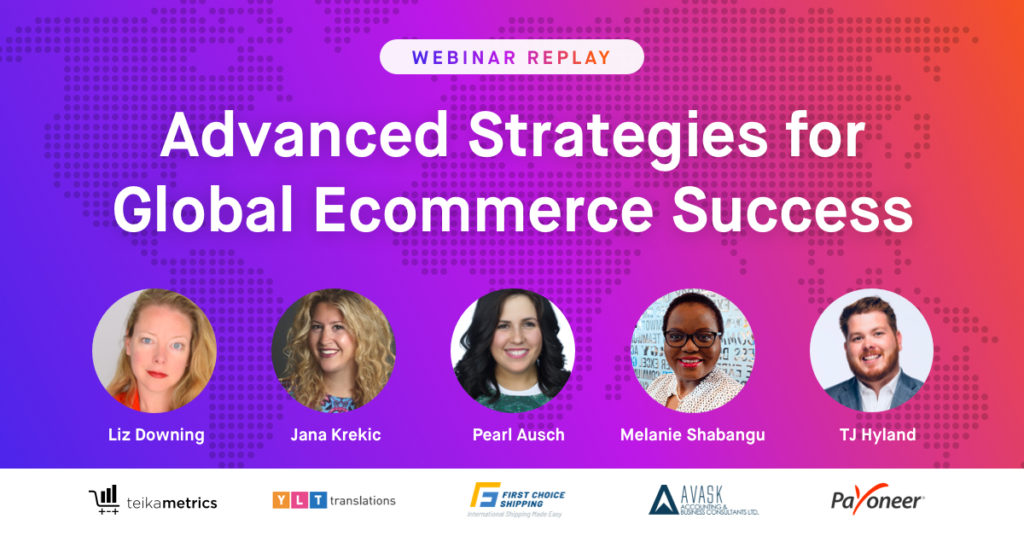Learn From The Experts On Global Ecommerce
Do you feel like you’re starting to hit your stride on Amazon in the US? Then it’s time to think about your ecommerce business in terms of international growth. Amazon’s many marketplaces are a wealth of opportunity, and we want to make sure you’re taking advantage of the right marketplaces, best practices, and resources.
We asked a panel of top experts in global expansion to join us for a great conversation about how to take your business to new heights across different Amazon international marketplaces.
Liz Downing of Teikametrics, Pearl Ausch of First Choice Shipping, Jana Krekic of YLT Translations, Melanie Shabangu from AVASK Accounting, and TJ Hyland from Payoneer all contributed their expertise.
Check out the webinar replay and key takeaways below as you prepare for global expansion across Amazon’s marketplaces.
Webinar Topics
- Advanced international shipping & logistics
- Implications of Brexit
- International payment strategies
- VAT (value-added tax) reforms & your global growth strategy
- New marketplaces & new strategies
Show Links
- Connect with Liz and Teikametrics
- Connect with Pearl and First Choice Shipping
- Connect with Jana and YLT Translations
- Connect with Melanie and AVASK Accounting
- Connect with TJ and Payoneer
- Follow Teikametrics on Twitter where we live-tweeted the webinar with the hashtag #TeikaLive
Watch the Advanced Strategies for Global Ecommerce Success Replay:
Key Takeaways
Amazon is expanding its marketplaces
Liz explained that even through the challenges of the global pandemic, Amazon has continued to add international marketplaces. There have been eight new ones launching just since 2019.
“In the midst of a global pandemic and everything else, other marketplaces, which were established before the pandemic and continue to exist, thrive, and grow… it’s so very exciting for ecommerce brands who are looking to expand their reach and reach new audiences through Amazon platforms.” – Liz Downing
At the same time Amazon is throttling FBA storage
Several speakers talked about the enormous challenges sellers are facing when dealing with highly restrictive policies Amazon has implemented around FBA storage.
Pearl reflected on the hope that there will be some relief after Prime Day.
“First, Amazon had a storage limit, then it became a per-ASIN limit and we thought it would become better and it didn’t. So it went from good to bad to worse, and today people are saying that it got even worse over the weekend. So everybody’s speculating, and what we’re hoping for, is that when Prime Day comes and goes, Amazon cleans up their warehouses and everything starts bouncing back to at least some normalcy.” – Pearl Ausch
But Melanie wondered where Amazon is going to be able to handle the volume of goods that sellers need to be able to ship and suggested it would be wise to plan for this being the new normal.
“Where is Amazon going to keep all of your inventory? So you need to make sure that you’ve got plan B, not just for now, but as a long-term strategy.” – Melanie Shabangu
First-movers win
TJ pointed out that the sellers who are among the first to enter new international marketplaces will have an advantage over their competition.
“The people that are bold and understand you have to be one step ahead of the competition… and those jumping into international marketplaces from the jump, are the ones reaping most of the benefits.” – TJ Hyland
Localization matters
It’s important to understand the details and nuances of each individual marketplace. What’s hot and what’s working in one marketplace varies considerably.
Jana suggested checking out both the Turkish and Polish marketplaces in Europe as well as the UAE.
“Poland is something that everybody is rushing to. There’s this FOMO about Poland and I would definitely suggest you try to place your best-selling products in this specific marketplace.” Jana Krekic
Brexit changed how sellers can ship
Following Brexit, Pearl explained, sellers had their goods getting stuck in German customs for months. One solution to the delays in Germany turned out to be to go through the Netherlands in order to get goods to Germany.
“So we came up with a solution where instead of going through Germany, we are going through the Netherlands into Germany. And that way the customs are not so stringent and practically impossible to deal with.” – Pearl Ausch
VAT reforms affect reporting
Changes in VAT (value-added tax) requirements will affect sellers and marketplaces like Amazon. Melanie detailed how there are elements sellers need to keep in mind and others that they don’t need to worry about.
“Now that the marketplace will be collecting the VAT… that’s a good thing from an administration point of view.You [as a seller] don’t have to stress about it.” – Melanie Shabangu
Do business in local currency
If you’re selling in international marketplaces, your shoppers are going to be paying in their local currency. Amazon can convert that currency to your own local currency, but if you can minimize converting currency you can save on fees. You’ll need the local currency to pay taxes and can possibly also use it to pay suppliers.
TJ gave away one of his favorite tips related to operating in local currency.
“And one of the key strategies that I like to tell sellers is to go back to your supplier and ask them for an invoice in local currency. And why you do that is because that Chinese supplier is still going to need to convert the funds back into their local currency. They’re going to add in a little bit of a buffer to cover them in terms of the exchange movements. So if you ask them to invoice you in local currency, you’re going to get a true price for what they want, no extra buffer.” -TJ Hyland
Compliance is key
The more you do things by the book and strive for compliance, the more ready you’ll be for whatever surprises may come your way.
“Run your business like you will be exiting tomorrow, make sure everything is in order.” – Melanie Shabangu





